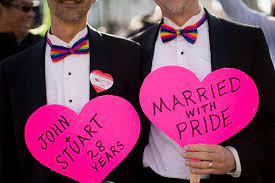
Supreme Court rules in favor of Christian designer in gay wedding website case
by Summer July 1, 2023 0 commentsLogic And Liberty Win Again!
By: Summer

In a 6-3 decision, the U.S. Supreme Court overturned a Colorado anti-discrimination law that required a devout Christian to design a wedding website for a gay couple, which was completely contrary to her religious beliefs and violative of her First Amendment right to freedom of speech and expression. Did the SCOTUS get this right, or are we starting down a slippery slope?
The Supreme Court ruled Friday that Colorado cannot require an evangelical Christian web designer to provide same-sex wedding websites.
The court found that the state’s anti-discrimination law violates Lorie Smith’s free speech rights under the First Amendment by demanding she creates same-sex wedding websites if she wants to do so for opposite-sex unions. Smith argued the requirement violated her religious beliefs.
The decision narrows states’ ability to apply public accommodation laws to artists, dealing a significant blow to LGBTQ advocates.
Justice Neil Gorsuch authored the majority opinion, writing for himself and the court’s five other conservatives.
“But, as this Court has long held, the opportunity to think for ourselves and to express those thoughts freely is among our most cherished liberties and part of what keeps our Republic strong,” Gorsuch wrote. “Of course, abiding the Constitution’s commitment to the freedom of speech means all of us will encounter ideas we consider ‘unattractive.’”
The court’s three liberal justices, Sonia Sotomayor, Elena Kagan and Ketanji Brown Jackson, dissented.
“Today is a sad day in American constitutional law and in the lives of LGBT people. The Supreme Court of the United States declares that a particular kind of business, though open to the public, has a constitutional right to refuse to serve members of a protected class. The Court does so for the first time in its history,” Sotomayor wrote.
As Colorado and other states in recent years added LGBTQ protections to their anti-discrimination laws, various wedding-service providers have filed court challenges asserting violations of their First Amendment rights.
The disputes have left judges grappling with how far states can go in regulating businesses’ conduct before they unconstitutionally interfere with artists’ religious beliefs or compel their speech.
“If anything is truly dispiriting here, it is the dissent’s failure to take seriously this Court’s enduring commitment to protecting the speech rights of all comers, no matter how controversial—or even repugnant—many may find the message at hand,” Gorsuch wrote.
Smith, a graphic designer, wanted to expand her website design company, 303 Creative LLC, to provide wedding websites. But she didn’t want to create websites for same-sex marriages, believing it would be a violation of her religious beliefs as a Christian. She also wanted to post a message on her company’s site indicating that view.
But Colorado’s public accommodation law prohibited businesses that serve the public from discriminating on protected characteristics, including sexual orientation.
“If you have ever taken advantage of a public business without being denied service because of who you are, then you have come to enjoy the dignity and freedom that this principle protects,” Sotomayor dissented, also warning the majority’s logic could be applied to justify racial discrimination.
“Lesbian, gay, bisexual, and transgender (LGBT) people, no less than anyone else, deserve that dignity and freedom,” she continued. “The movement for LGBT rights, and the resulting expansion of state and local laws to secure gender and sexual minorities’ full and equal enjoyment of publicly available goods and services, is the latest chapter of this great American story.”
Five years ago, the Supreme Court took up a similar challenge to Colorado’s law from Jack Phillips, who owns a cake shop a few miles away from Smith. Colorado’s civil rights commission had sued him for refusing to make a custom wedding cake for a gay couple.
The justices ultimately sided with Phillips on narrow grounds, leaving the question of whether the public accommodation law violated the First Amendment unresolved.
Before her planned expansion, Smith sued a group of Colorado officials. Smith argued enforcing the law against her would violate her constitutional rights to free speech and free exercise of religion.
Lower courts sided with Colorado. The justices agreed to hear Smith’s appeal, but the court limited its intervention to only consider her free speech arguments.
Twenty Republican state attorneys generals, roughly 60 Republican members of Congress, the Church of Jesus Christ of Latter-day Saints and various other religious groups wrote briefs backing Smith before the high court. The Biden administration backed Colorado and participated in oral argument, urging the justices to let the lower ruling stand.
The request was supported by the American Civil Liberties Union, the Human Rights Campaign, other LGBTQ advocacy groups, 137 members of Congress, 21 state attorneys general and the American Bar Association.







No Comments so far
Jump into a conversationNo Comments Yet!
You can be the one to start a conversation.Only registered users can comment.